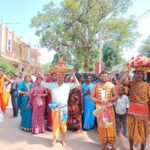Coronavirus-dengue combination will be fatal for Indians. Here’s why
Even as India continues to battle the deadly coronavirus pandemic, there is a growing concern of dengue, too, raising its ugly head during the monsoon season.
Now, scientists have warned that COVID-19 and the mosquito-borne disease have overlapping symptoms and the country’s healthcare infrastructure would not be able to cope with this double whammy.
The impact of a dengue-COVID-19′ season would entail two different diagnostic tests and extract a huge toll on patients too, each disease making the other more complicated to deal with and perhaps more fatal.
While the COVID-19 tally crossed the eight-lakh mark on Saturday to reach 8,20,916 cases with 22,123 fatalities, the incidence of dengue is also high.
Based on 2016-2019 data, virologist Shahid Jameel estimated that India gets about 100,000 to 200,000 confirmed cases of dengue each year.
According to the National Vector Borne Disease Control Programme (NVBDCP), 1,36,422 dengue cases were diagnosed in 2019 and an estimated 132 people died.
The virus is endemic and present around the year in southern India, and in monsoon and early winter in northern India, Jameel, CEO at DBT/Wellcome Trust India Alliance, a public charity that invests in building biomedical sciences and health research framework, said.
Both COVID-19 and dengue have symptoms such as high fever, headache and body pain.
The dengue season may aggravate the COVID-19 situation as both viruses may supplement each other, warned Dhrubjyoti Chattopadhyay, virologist and vice chancellor of the Amity University in Kolkata.
This situation is not yet well studied. But the information available from South America is dangerous and found to create a major challenge to their medical infrastructure, he said.
The effect will be very critical. As major symptoms are overlapping, simultaneous infection will be much more fatal. Weakened immune systems will help the other to be more fatal.
Once the dengue season starts, added virologist Upasana Ray, the infection spreads aggressively due to high prevalence of its mosquito vector, aedes aegypti.
Each season, we experience heavy loads in the hospital wards due to dengue outbreak and those times it gets almost unmanageable. So, have we thought about what will happen when we have two menaces to handle together? Both of them have overlapping symptoms. Are we geared to distinguish if a person has dengue or COVID 19? asked the senior scientist, CSIR-IICB, Kolkata.
The challenges are many.
Almost each patient with a three-day fever would need to undergo a test for dengue and another for the SARS-CoV-2 virus which causes COVID-19.
Considering the current numbers of COVID-19 patients, will our hospitals have beds available for dengue patients? Or will only severe dengue cases be handled at hospitals? she asked.
Explaining how the viruses manifest in the human body, Jameel said the dengue virus enters via a mosquito bite through the subcutaneous layer of the skin from where it reaches the lymph nodes that are rich in types of blood cells called monocytes, macrophages and dendritic cells.
The virus, he said, primarily reproduces in these cells and can severely alter cytokine production by these cells, a fundamental response to injury and infection in the body.
On the other hand, SARS-CoV-2 enters the cells primarily through mucosal membranes of the mouth and nasal cavity and initially replicates in the epithelial cells of the upper respiratory tract.
In some cases, however, the infection moves down the trachea into the lungs, where it infects the air sacs that exchange oxygen with blood. This causes inflammation as the immune system tries to fight the virus and leads to fluid accumulation in the lungs, which results in respiratory distress and oxygen demand.
So, you see, both viruses infect via different pathways and different cell types. There would of course be overlaps in physiological effects and immunological responses. They would most likely make each disease worse than either infection alone, Jameel noted.
The most likely effect, he said, would be on healthcare capacity.
Since initial clinical presentation is similar — high fever — one would be ignored at the expense of the other. With hospitals mainly in COVID-19 mode, they may also refuse dengue patients, Jameel said.
He said this has been already seen in connection with pregnancy care and deliveries, dialysis and tuberculosis treatment.
We need to be careful and deploy tests for dengue also for febrile illness. Thankfully, India makes some very good tests for dengue virus, e.g. NS1 antigen test that is positive on the first day of fever, said Jameel.
Ray pointed out that there is no vaccine available clinically for either and no specific antiviral to treat them.
This infection may show low to severe forms of infection including simple dengue fever, severe dengue and the haemorrhagic fever, said Ray.
We are already amidst the SARS-CoV2 pandemic and hospitals are running out of beds although the government is trying its level best. We are yet to attain enough facility to handle the increasing coronavirus cases every day in India, she said.
According to Ray, careful preparation is needed as the country has very little time before a full-blown dengue season starts.
While many dengue patients don’t end up in critical care units (CCUs), a good fraction do. Do we have enough ICUs and CCUs to tackle dengue and COVID 19 together? Do we have enough trained manpower?
Healthcare and research, she said, need to gear up to fight this upcoming very realistic situation.
Dengue menace across India
A 32-year-old woman from Parpunja in Puttur taluk of Dakshina Kannada district has died due to dengue in a private hospital at Deralakatte here, health department sources said on Friday.
The deceased, identified as Naseema, has been suffering from fever for the last few days and was under treatment at Puttur. After her condition turned worse, she was shifted to the private hospital at Deralakatte. However, she succumbed to the disease Thursday night, sources said.
This is the second death due to dengue reported in the taluk in seven days. A woman from Bettampady in the taluk had succumbed to the disease last week. The district health department had already begun an awareness programme among the public on the preventive measures to be taken to stay safe from the disease.
Two cases of dengue were detected in Kolkata on Thursday, even as the city grappled with the COVID-19 pandemic, a senior official said.
A 68-year-old person and a 13-year-old were diagnosed with the vector-borne disease, said Atin Ghosh, Kolkata Municipal Corporation’s administrator in-charge of health.
“Both of them are undergoing treatment. There is nothing to panic. During monsoon, there are cases of dengue every year, we are taking all precautions,” he said.
In Hyderabad, which has an average of 1,200 COVID-19 cases a day, the number of dengue cases has been silently increasing. The city had 4 cases of the mosquito-borne infection in April, nine in May, and 14 in June. This month, one dengue case has been confirmed and results are awaited on seven more.
The dengue cases came to the notice of the Greater Hyderabad Municipal corporation (GHMC) when private hospitals began insisting on a dengue test along with COVID-19 screening.
The authorities have notified the government to make dengue tests mandatory in all government hospitals designated to treat COVID-19 patients. There is a fear that the number of dengue cases would increase if all COVID-19 patients undergoing treatment in government hospitals are tested.
-The Asian Age






